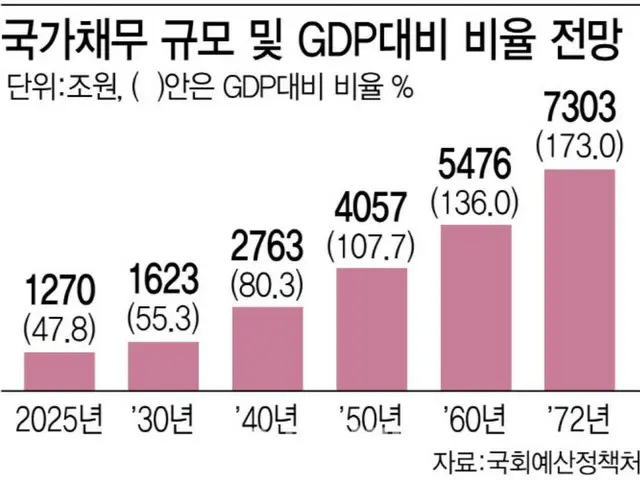The economic growth rate will continue to decline, and the depletion of the national pension fund will lead to a rapid increase in the national debt.
According to the report, if current laws and systems remain in place, real GDP growth is estimated to fall from 2.2% this year to 0.3% in 2072.
National debt will grow from 1,270.4 trillion won (US$1.324 trillion) in 2025 to 7,303.6 trillion won (US$7.61 trillion) in 2072.
The average annual growth rate is expected to be 3.8%. The GDP growth rate will slow, but the national debt will increase, and the national debt to GDP ratio is expected to increase rapidly.
It is expected to exceed 100% in 2050, from 7.8%, to 107.7%, and to reach 173% in 2072. This means that by 250, all products produced in Korea will be converted into cash, and the gold price will be 100%.
This means that the size of the national debt will be greater than the amount of the budget. This is because the government's expenditures have far exceeded its income. The government's total income this year is 650.6 trillion won (approximately 1.2 trillion won).
The annual average growth rate is expected to be only 0.8% from 67.8 trillion won (24.5% of GDP) in 2019 to 930.2 trillion won (approximately 97 trillion won / 22.0% of GDP) in 2072.
Total expenditures will increase from 676.3 trillion won (approximately 70.4 trillion yen/25.5% of GDP) to 1,418.5 trillion won (approximately 147.8 trillion yen/33.5% of GDP) in 2072.
The National Pension Fund is expected to increase by an average of 1.6% per year to 20.6%. In particular, the Budget Office has analyzed that the depletion of the National Pension Fund will have the greatest impact on the fiscal deficit.
It is predicted that after peaking at 1,936.9 trillion won (about 201.8 trillion yen) in 2039, it will turn into a deficit from 2040 and be completely depleted by 2057.
"Even now, the country is running a deficit of 70 trillion won (US$70 billion) to 80 trillion won (US$80 billion) every year," said Kang Sung Jin, a professor of economics at Korea University.
"We are already facing problems with rising debt," he said. "While we look for ways to reduce the fiscal deficit by increasing revenue and reducing expenditures, we also need to hurry up with reforms to slow the depletion of the national pension fund."
"It will not happen," he emphasized.
2025/02/24 07:07 KST
Copyrights(C) Edaily wowkorea.jp 107

